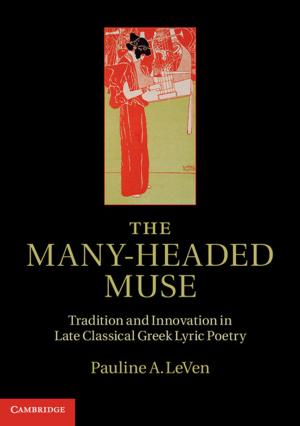| Author: | Megan H. Reid | ISBN: | 9781107064829 |
| Publisher: | Cambridge University Press | Publication: | July 22, 2013 |
| Imprint: | Cambridge University Press | Language: | English |
| Author: | Megan H. Reid |
| ISBN: | 9781107064829 |
| Publisher: | Cambridge University Press |
| Publication: | July 22, 2013 |
| Imprint: | Cambridge University Press |
| Language: | English |
The Ayyubid and Mamluk periods were two of the most intellectually vibrant in Islamic history. Megan H. Reid's book, which traverses three centuries from 1170 to 1500, recovers the stories of medieval men and women who were renowned not only for their intellectual prowess but also for their devotional piety. Through these stories, the book examines trends in voluntary religious practice that have been largely overlooked in modern scholarship. This type of piety was distinguished by the pursuit of God's favor through additional rituals, which emphasized the body as an instrument of worship, and through the rejection of worldly pleasures, and even society itself. Using an array of sources including manuals of law, fatwa collections, chronicles, and obituaries, the book shows what it meant to be a good Muslim in the medieval period and how Islamic law helped to define holy behavior. In its concentration on personal piety, ritual, and ethics the book offers an intimate perspective on medieval Islamic society.
The Ayyubid and Mamluk periods were two of the most intellectually vibrant in Islamic history. Megan H. Reid's book, which traverses three centuries from 1170 to 1500, recovers the stories of medieval men and women who were renowned not only for their intellectual prowess but also for their devotional piety. Through these stories, the book examines trends in voluntary religious practice that have been largely overlooked in modern scholarship. This type of piety was distinguished by the pursuit of God's favor through additional rituals, which emphasized the body as an instrument of worship, and through the rejection of worldly pleasures, and even society itself. Using an array of sources including manuals of law, fatwa collections, chronicles, and obituaries, the book shows what it meant to be a good Muslim in the medieval period and how Islamic law helped to define holy behavior. In its concentration on personal piety, ritual, and ethics the book offers an intimate perspective on medieval Islamic society.















